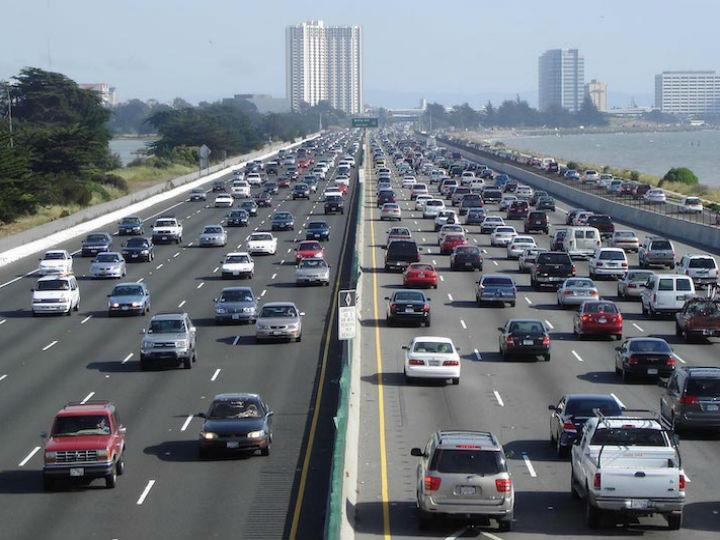by Frederic Simon
Some 3 million public charging points will have to be available by 2030 in order to sustain the rise in electric vehicles needed for Europe’s long-term climate objectives, according to a new report by green campaign group Transport & Environment (T&E).
Assuming 44 million electric vehicles are on European roads by 2030 that means a fifteen-fold increase on the 185,000 public chargers currently available in the EU, the research found.
This is slightly more than what Brussels has in mind.
“The European Commission talks about 1 million public chargers for 2025 while we calculate 3 million in 2030 and 1.2-1.3 million in 2025 depending on the scenario,” says Lucien Mathieu, e-mobility analyst at T&E, who is the main author of the report.
“The Commission’s estimate for the number of public chargers is on the conservative side,” Mathieu told EURACTIV. Indeed, T&E assumes more and more EV buyers will have to rely solely on public charging because they have no private parking available.
Both T&E and the Commission agree however that around 13 million electric vehicles will be on European roads by 2025, although the EU executives also includes “low-emission vehicles” such as hydrogen fuel cell cars into the mix.
Green deal
Electric mobility in Europe was given a shot in the arm with the presentation of the European Green Deal last December. Under the Commission’s new environmental pact, Brussels will tighten CO2 emission limits on cars and vans in order “to ensure a clear pathway from 2025 towards zero-emission mobility”.
Automakers say this gives them no choice but to go for a full electrification of the car fleet.
“A dense EU-wide network of charging points and re-fuelling stations must urgently be deployed,” said a spokesperson for ACEA, the European Automobile Manufacturers Association.
“This is one of the most important enabling conditions for achieving carbon neutrality,” the spokesperson told EURACTIV, saying “everyone must have the option to recharge or re-fuel their vehicle easily, no matter where they live or where they want to travel to”.
In November last year, German automakers met with top government representatives and agreed to roll out 1 million charging points for electric vehicles across the country by 2030.
This is more than what Brussels had been hoping for.
“About 1 million” public charging points will be needed across the EU “by 2025”, said Alexandre Paquot, a senior EU official who spoke at a EURACTIV event last year. That figure was later confirmed in the European Green Deal outlined by the Commission in December.
Charging infrastructure “is clearly an area where member states and industry need to work further,” Paquot said, calling on all players involved to “think longer-term” in order to reach the EU’s climate neutrality objective for 2050.
EU rules on infrastructure set for review
To finance a pan-European recharging infrastructure, T&E estimates €20 billion will be needed over the next 11 years, or €1.8 billion a year on average.
Home and workplace charging must be prioritised, it argues. And between 20-30% of these chargers will need to be in disadvantaged and less densely populated areas to ensure everyone benefits from zero-emissions vehicles, it says.
The upcoming revision of the EU’s Alternative Fuels Infrastructure Directive will be “critical” in this regard to ensure a swift and harmonised roll-out of chargers across Europe, T&E argues, calling for a review of EU rules to be brought forward this year instead of 2021.
The Commission said it will support the deployment of charging infrastructure where persistent gaps exist, notably for long-distance travel and in less densely populated areas.
“As quickly as possible, the Commission will launch a new funding call to support this,” a spokesperson told EURACTIV, saying this will complement measures taken at national level.
Carmakers agree that stronger EU rules must be introduced, including “mandatory targets for charging points and re-fuelling stations at the national level with clear enforcement measures,” the ACEA spokesperson said.
A multi-billion euro market opportunity
But the number of charging points is not the only challenge. Other important changes also need to happen on the side of the electricity grid and the organisation of power markets and digital payment systems.
“The sheer number of public chargers available is not sufficient,” Mathieu warned, saying many other “qualitative requirements” should also be considered to make the electric mobility revolution a reality.
These include the digital ‘smartness’ of the grid, the availability of charging stations in disadvantaged neighbourhoods, the coverage of the highway network, transparent and fair pricing, and the availability of seamless payment systems.
“The shift to EVs will create a multi-billion euro market opportunity for European industry in the grid works, and manufacturing, installation and maintenance of public charging,” Mathieu said, arguing this will also support jobs in Europe.
The electricity industry is aware of this and is pushing for infrastructure changes to enable the shift to e-mobility.
“As we accelerate the roll out of public charging points, we must also channel more funds for the reinforcement of distribution grids,” said Kristian Ruby, secretary general of Eurelectric, the EU power industry association.
Last year, Eurelectric, ACEA and T&E joined efforts on e-mobility by signing a joint call to action for the accelerated deployment of electric vehicle charging points across Europe.
“It’s probably an indication of the direction we’re taking as an automotive industry, the direction we all need to take if we are serious about decarbonisation,” said ACEA secretary-general Erik Jonnaert. “It’s a changed mindset”.
*first published in: www.euractiv.com




 By: N. Peter Kramer
By: N. Peter Kramer
